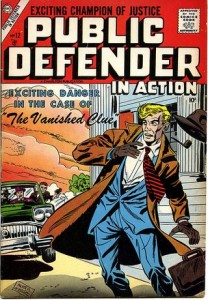Maryland Recognizes Constitutional Right to Counsel at Initial Appearance Hearings
Anyone who has ever watched an episode of “Law & Order” can tell you that as a criminal defendant, you have the right to an attorney, and if you cannot afford an attorney, one will be provided for you by the state.
These are the rights as outlined by the Supreme Court in Miranda v. Arizona.[1] However prior to today, September 25, 2013, that right did not extend to a defendant’s initial hearing after being arrested in the state of Maryland.
In a 4-3 decision, the Maryland Court of Appeals held in DeWolfe v. Richmond, No. 34, September Term, 2011 (decided September 25, 2013) that Article 24 of the Maryland Declaration of Rights guarantees an indigent defendant the right to state-furnished counsel at an initial appearance before a District Court Commissioner.[2]
The case initially came before the Court of Appeals in 2011. On January 24, 2012 the Court determined on statutory grounds that, under the State Public Defender Act,[3] defendants were entitled to representation at an initial appearance before a Commissioner. In response to this decision, amid concerns about the cost of having attorneys on call 24/7, the General Assembly passed, and the Governor signed into law, emergency measures on May 22, 2012 which specifically noted that “Representation is not required to be provided to an indigent individuals at an initial appearance before a District Court Commissioner.”[4] The Court’s opinion today held that there was a constitutional right – not just a statutory right – to state-furnished counsel at an initial appearance before a Commissioner, effectively overriding the 2012 emergency measures.
What is an initial appearance?
After someone is arrested and processed at the police station, they are then brought before a judicial officer for an initial appearance. Most people assume this means they are brought before a judge. Although a first appearance may be before a judge, the general practice throughout Maryland is that District Court Commissioners preside over initial appearances. Commissioners are judicial officers, appointed by the Chief Judge of the District Court of Maryland. Although often well-versed in the law, there is no requirement that a Commissioner be a lawyer or have any familiarity with Maryland law.[5] There are more than 240 District Court commissioners around the state, available 24 hours a day, 365 days a year.
At an initial appearance, the Commissioner determines whether there is probable cause for the defendant’s arrest if the arrest occurred without a warrant. If there is no probable cause – for the arrest or for any of the charges listed – the defendant is released with no limiting conditions. If the Commissioner finds there is probable cause, they then must determine whether a person is eligible for pretrial release or should remain incarcerated.
The Commissioner may decide to release a defendant on their own recognizance,[6] or they may impose a bail amount that the defendant must pay before they are released, to ensure there is some incentive for them to appear at later court dates. The Commissioner may also determine that the defendant should have “no bail,” and remain incarcerated until a further bail hearing before a judge. If the Commissioner decides not to release the defendant, the defendant must be presented to a Judge immediately. If Court is not in session, the defendant must be presented to a Judge at the next opportunity when Court is in session. More often than not, the Judge upholds the bail set by the Commissioner at this later bail review hearing.
What are the arguments against counsel at the initial appearance?
The dissenting judges, including newly-appointed Chief Judge Mary Ellen Barbera, made several valid points against declaring the right to counsel at an initial appearance before a Commissioner a constitutional right. The Court noted that pursuant to Maryland Rule 4-216(c), there is a presumption at the hearing before the Commissioner that a defendant will be released on personal recognizance or bail unless the Commissioner determines that there are absolutely no conditions of release that can be imposed that will ensure the appearance of the defendant at a later proceeding, the safety of the victim, or community at large. This means that, unless there is a solid showing that there is no way the defendant will appear later on, or is a danger to himself or others, the Commissioner should release the Defendant with minimal conditions.
Importantly, and a focus of the dissenting opinion, the initial hearing before a Commissioner is just that – initial. There is ample opportunity for judicial review of the Commissioner’s decision, and the initial appearance does not result in a final determination of incarceration: “The very fact of speedy review of the Commissioner’s preliminary determination, by a judge at a formal court proceeding where defense counsel can argue against the Commissioner’s initial bail decision, negates any realistic concern about unfair procedural process.” DeWolfe v. Richmond, No. 34, September Term, 2011 (decided September 25, 2013) (Barbera, C.J. dissenting).
What is the effect of this ruling?
It will be intriguing to see what the practical effect of this ruling is, given that over half of the bail review hearings before a judge—where defendants were already afforded the right to counsel—uphold the Commissioner’s decision. Certainly, it will have a huge effect on the already short-handed Public Defender’s Office in terms of staffing and scheduling needs to cover the additional 177,000 annual hearings they are now required to attend.[7] As for the ultimate cost of this holding to the taxpayers, estimates range from $28 million to hundreds of millions of dollars that will be needed to fund additional coverage at initial appearance hearings by State’s Attorneys, Public Defenders, and other court personnel.
Kara Fischer is an associate in the Litigation group at Joseph, Greenwald & Laake, P.A. She focuses on all aspects of civil ligation, including civil rights cases, business and contract disputes, employment litigation, and personal injury cases. She also practices criminal defense throughout Maryland. You can find her on LinkedIn or email her at kfischer@jgllaw.com.
[1] 396 U.S. 868 (1969).
[2] Article 24 regarding Due Process, reads: “That no man ought to be taken or imprisoned or disseized of his freehold, liberties or privileges, or outlawed, or exiled, or, in any manner, destroyed, or deprived of his life, liberty or property, but by the judgment of his peers, or by the Law of the land.”
[3] Maryland Code (2001, 2008 Repl. Vol, 2012 Supp.), Criminal Procedure Article § 16-204(b).
[5] See Maryland Code (1974, 2013 Repl. Vol.) Courts and Judicial Proceedings Article § 2-607(b).
[6] This means the defendant is released on their own promise to appear at later court dates; no bail or bond is required.
[7] Steve Lash, “Md.’s top court finds constitutional right to lawyer at bail”, Daily Record (Sept. 25, 2013).



